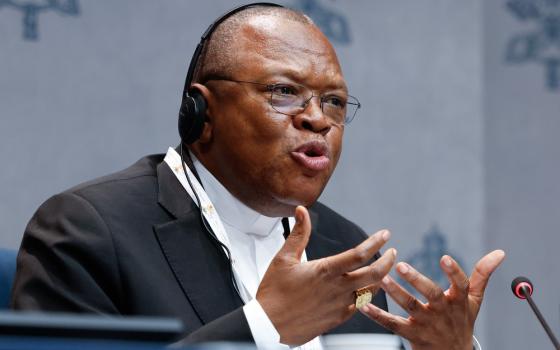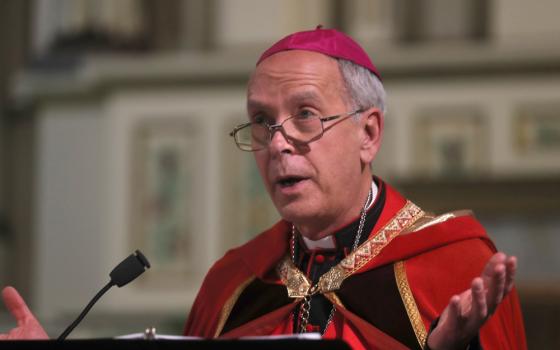
A woman pushes a shopping cart full of coolers and cold beverages during a summer heatwave in New York City July 11, 2024. In recent weeks, several U.S. states have had record-breaking hot weather. (OSV News/Caitlin Ochs, Reuters)
It's the sort of record no city wants to hold, but Las Vegas now does: seven consecutive days of searing temperatures of 115 degrees or above.
Even the National Weather Service in Las Vegas seemed stunned, posting July 12 on X (formerly Twitter), "With a high temperature of 115°F this afternoon we not only extended our streak to 7 days, but we also broke the daily record high. This makes today the 7th day IN A ROW that we have broken or tied daily high temps!"
The emojis that followed the disbelieving, partially all caps exclamation reinforced its message with flames, a sweating red emoji face, and an emoji head exploding in a mushroom cloud.
Last year was the hottest year on record for the world, since global records began in 1850, the U.S. National Oceanic and Atmospheric Administration reported.
In recent weeks, Western states such as Arizona, California, Oregon and Nevada have all posted record-breaking heat — but in the East, North Carolina and Maryland have also shattered records.
So is this "just summer" — or something else?
"In the Northern Hemisphere, this is summer — but it is not the summer of my childhood and it won't be the summer of future generations," Dan Misleh, founder and executive director of the Catholic Climate Covenant, told OSV News.
The climate organization is a consortium of 20 national partners founded with the help of the U.S. Conference of Catholic Bishops to guide the American church's response to climate change.
"Years ago scientists warned us about the impacts of burning fossil fuels and predicting this type of warming," Misleh noted. "So I am not surprised that every year in the last 10 years has broken historical averages — going as far back as we've been tracking temperatures globally and in the U.S."
Anna Johnson said she has been receiving stories and images of the heatwave's effects. She is North American senior program manager for the Laudato Si' Movement, a global network of over 900 Catholic organizations and over 10,000 trained grassroots leaders dedicated to mobilizing the Catholic community "to care for our common home and achieve climate and ecological justice."
"Catholics across the country are sending us pictures of the ways their homes, work and families are being impacted by this heat wave, from flooding in Florida to the impacts of Hurricane Beryl in Texas to their gardens struggling," Johnson said. "The people who labor outside, whether they are harvesting the food we eat, repairing our roads, working in construction, or so many other jobs, are asking for our prayers for their health."
At Catholic Charities of Southern Nevada — which operates 16 programs providing support to more than 4,500 people daily, as well as the largest Meals on Wheels program and emergency shelter services in the area — a summer drive is under way to raise funds and other resources, like water, to combat the heat.
Advertisement
"The individuals that we're serving are the most vulnerable in our city," said Leslie Carmine, director of media and community relations. "So when you add an inclement weather element — or an extreme weather element — it can be that much harder."
While none of their clients have yet succumbed to the temperatures, "those few degrees definitely make a difference," said Carmine. "You do have to be extra vigilant about trying to stay hydrated, even if you don't feel thirsty."
Carmine said the organization is extending its services beyond normal hours, making certain its guests and clients have extra water, and being especially attentive to heat-related health issues.
"If they don't have access to regular medical care, it can make those issues harder to deal with — and it becomes more dangerous as well," shared Carmine. "They may not be able to just go into the fridge and get a bottle of water like some people — maybe some people take that for granted."
"Many of us have the resources — and good fortune to be born in a wealthy country — to deal with this kind of heat," Misleh reflected. "But billions of our brothers and sisters, both in the U.S. and especially in developing countries, have no such fortune."
"We do have the solutions to begin to dramatically reduce the greenhouse gases that are creating this problem," confirmed Misleh, "but we need to act fast and with purpose."
Past and present popes have for decades warned of approaching climate complications.
Thirty-four years ago, on the 23rd World Day for Peace in 1990, St. John Paul II cautioned, "The most profound and serious indication of the moral implications underlying the ecological problem is the lack of respect for life evident in many of the patterns of environmental pollution."
"Often," the pontiff said, "the interests of production prevail over concern for the dignity of workers, while economic interests take priority over the good of individuals and even entire peoples."
Johnson unequivocally agrees.
"Without urgent and strong action to move our society away from fossil fuel production and towards a healthy and sustainable future — of course rooted in support for everyone working in these industries — we will only continue to see heat waves like this become more frequent and more extreme, hurting our health, the lands and waters we love, and everything from our work to our holidays," she said. "God's creation is crying out to us; pleading with us to change our ways — both personal and systemic — for the health of all creation, including our own."






